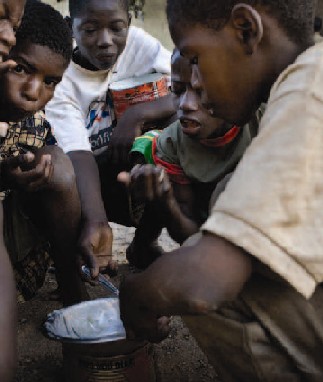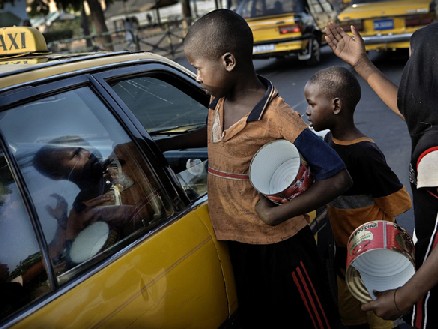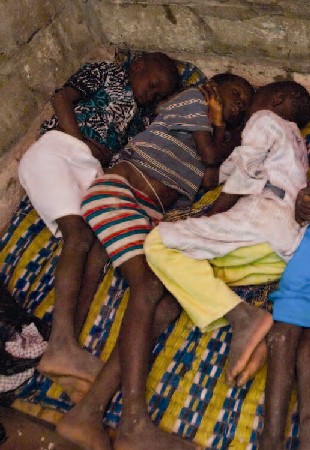|
Senegal Society | Human rights Child abuse also among Senegal's Muslim clergy
The systematic abuse of young boys in Senegalese Quranic schools is revealed in a 114-page report released today by the US-based group Human Rights Watch. The report concludes that "tens of thousands of children at residential Quranic schools in Senegal are subjected to slavery-like conditions and severely abused."
In the more than 100 daaras from which Human Rights Watch interviewed current or former talibés, the marabout typically collects between € 15,000 and € 45,000 a year from the boys' begging - a substantial sum in a country where most people live on less than € 1.50 a day. Interviews suggest that some marabouts amass upward of € 75,000 a year through exploiting children in their care. An 11-year-old boy sent by his parents to a marabout in Dakar, Senegal's capital, at age seven told Human Rights Watch: "Every day I had to bring the marabout 600 CFA (€ 1), rice, and sugar. Every time I couldn't, the marabout would beat me with an electric cord. He would strike me so many times on the back and the neck; too many to count.... Each time I was beaten, I would think of my family, who never laid a hand on me. I would remember being at home. Eventually I ran away, I couldn't handle it anymore." The report further documented "the extremely precarious condition in which these boys live." The substantial sums of money, rice, and sugar collectively brought in by begging talibés were not used to feed, clothe, shelter, or otherwise provide for the children. Many of the children suffered severe malnutrition, while the long hours on the street put them at risk of harm from car accidents, physical and sexual abuse, and diseases. A typical daara is an abandoned or partially constructed building that offers little protection from rain, heat, or cold. The children sleep as many as 30 to a small room. Disease spreads quickly and the children often fall ill - from skin diseases, malaria, and stomach parasites - but are rarely cared for by the marabouts. Instead, many children are forced to beg overtime to pay for their own medicines. Most talibés interviewed by Human Rights Watch said they had only one change of clothes, and over 40 percent did not have a single pair of shoes, leaving them to beg barefoot. Some tali
"Instead of marabouts ensuring that the boys in their care have food, education, and proper shelter, all too often the young boys become the means to provide for the marabout and his family," Ms Gagnon said. "This is unconscionable." Exhausted by continuous abuse and near-total deprivation, more than 1,000 boys run away from daaras each year. "Hundreds of children living on the streets in Senegal's major cities represent one of the defining legacies of the most exploitative residential Quranic schools," according to the report. Human Rights Watch now urges Senegalese authorities to regulate all Quranic schools and "take immediate and concerted action to hold accountable teachers who violate Senegalese laws against forced begging and child abuse." The Senegalese government enacted legislation in 2005 that criminalised forcing others into begging for personal financial gain. But authorities have not taken concrete steps to implement the law and end the exploitation and abuse of the talibés. "Not one marabout has been charged or tried solely for the crime of forced begging, although large numbers of these children can be seen on the streets on any given day," Human Rights Watch complains. "Although many of the children in Senegal's daaras come from neighbouring Guinea-Bissau, its government has failed to hold marabouts accountable even in clear cases of child trafficking. Guinea-Bissau also risks the practice of forced begging taking root domestically should it fail to learn the lessons of Senegal's decades of inaction," the report warns. "Millions of dollars are pouring in to humanitarian and government programs to help the talibés and prevent abuse, yet the prevalence of forced child begging in daaras continues to rise," Ms Gagnon said. "The rampant abuse of these children will only be eradicated when the government brings offending marabouts to book." By staff writer © afrol News - Create an e-mail alert for Senegal news - Create an e-mail alert for Society news - Create an e-mail alert for Human rights news
On the Afrol News front page now
|
front page
| news
| countries
| archive
| currencies
| news alerts login
| about afrol News
| contact
| advertise
| español
©
afrol News.
Reproducing or buying afrol News' articles.
You can contact us at mail@afrol.com










